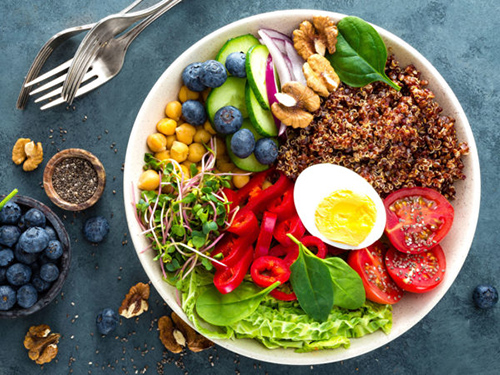
The macrobiotic diet plan is quickly becoming a favorite for many dieters worldwide. The term macrobiotic signifies the science of health and longevity. It represents the belief that everyone is influenced by their environment, social relations, geography, and climate.
According to macrobiotics, illnesses are viewed as the body trying to return to a more harmonious and dynamic existence with mother nature. The absence of a healthy diet and lifestyle is seen as a significant factor affecting an individual’s health and well-being.
A macrobiotic diet plan does not only refer to a daily diet; it embraces the significance of acquiring healthy lifestyle habits for the long term.
Macrobiotic Diet Plan: What Foods Are Allowed?
The macrobiotic diet plan prioritizes locally grown organic foods that are prepared naturally. If you must undertake a macrobiotic diet menu, you must prepare and cook foods with special care. Macrobiotic diet recipes emphasize eating and preparing steamed, boiled, and baked foods. Eating fried and processed foods is highly prohibited.

The main foods comprising the diet are vegetables, fish, nuts, whole grains, seeds, fruits, soups, and other natural products. You can also modify the diet to suit your individual needs. This ability is excellent for people with certain health conditions.
People with certain health conditions or special dietary requirements can fine-tune the macrobiotic diet plan while still sticking to the main principles of the program. People who utilize the macrobiotic diet plan for weight loss are encouraged to eat as slowly as possible and chew their food thoroughly.
Foods to Avoid When on The Macrobiotic Diet Plan
This diet plan strongly recommends that the foods eaten be natural; fried and processed foods must be avoided at all costs. Foods that should be avoided are dairy products, flour, potatoes, zucchini, poultry, alcohol, refined flour, sugar, caffeine, and fatty meats.
The diet is unique because it attempts to achieve balance throughout your life. Therefore, highly concentrated and over-stimulating foods must be prohibited from your daily diet.
Macrobiotic Diet Plan Studies
According to many studies, adhering to a macrobiotic diet has helped many people lower their blood pressure and cholesterol levels. This benefit is why natural health advocates agree that this diet is an excellent preventative against cardiovascular diseases.

Experts also believe this diet is an excellent inclusion to any cancer prevention program. Unfortunately, the macrobiotic diet plan is currently immersed in controversy. Opponents of the diet believe that it does not carry benefits for people who have been diagnosed with malignancies.
Alternatively, many detailed reports claim that its medicinal effects are extraordinary for patients suffering from advanced cancers. However, to this day, there have not been enough studies to prove or disprove the benefits of a macrobiotic diet plan.
More research is needed to confirm the efficiency of this diet in treating and preventing cancer. Other significant concerns expressed by opponents of the plan include claims of nutritional deficiencies.
With all the negative things said about this diet, dismissing the long-term benefits of any specific diet that promotes locally and organically grown foods and eliminates highly processed and fatty foods is still unwise.
You will be on your way to better health if you are patient and consume various nutrient-rich foods. Remember to incorporate non-dairy foods fortified with vitamin D and calcium, such as almond milk and soy, because this diet prohibits dairy. Also, regular exercise plays a significant role in the macrobiotic lifestyle. Make sure to exercise regularly.
DISCLAIMER: All content on this website is presented solely for educational and informational objectives. It would be best to not rely on the information provided as a replacement for advice, diagnosis, or treatment from a qualified medical expert. If you are pregnant, nursing, or have any preexisting medical concerns, you should talk to your doctor before using any herbal or natural medicines.
REFERENCES
- The Kitchn: https://www.thekitchn.com/
- Monterey Bay Aquarium Seafood Watch: https://www.seafoodwatch.org/
- Vegetarian Resource Group: https://www.vrg.org/
- National Institutes of Health: Office of Dietary Supplements: https://ods.od.nih.gov
